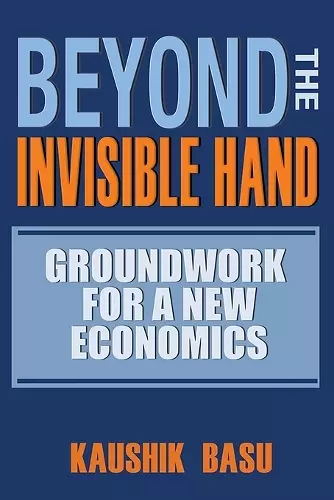Beyond the Invisible Hand
Groundwork for a New Economics
Format:Paperback
Publisher:Princeton University Press
Published:22nd Jul '16
Currently unavailable, and unfortunately no date known when it will be back

One of the central tenets of mainstream economics is Adam Smith's proposition that, given certain conditions, self-interested behavior by individuals leads them to the social good, almost as if orchestrated by an invisible hand. This deep insight has, over the past two centuries, been taken out of context, contorted, and used as the cornerstone of free-market orthodoxy. In Beyond the Invisible Hand, Kaushik Basu argues that mainstream economics and its conservative popularizers have misrepresented Smith's insight and hampered our understanding of how economies function, why some economies fail and some succeed, and what the nature and role of state intervention might be. Comparing this view of the invisible hand with the vision described by Kafka--in which individuals pursuing their atomistic interests, devoid of moral compunction, end up creating a world that is mean and miserable--Basu argues for collective action and the need to shift our focus from the efficient society to one that is also fair. Using analytic tools from mainstream economics, the book challenges some of the precepts and propositions of mainstream economics. It maintains that, by ignoring the role of culture and custom, traditional economics promotes the view that the current system is the only viable one, thereby serving the interests of those who do well by this system. Beyond the Invisible Hand challenges readers to fundamentally rethink the assumptions underlying modern economic thought and proves that a more equitable society is both possible and sustainable, and hence worth striving for. By scrutinizing Adam Smith's theory, this impassioned critique of contemporary mainstream economics debunks traditional beliefs regarding best economic practices, self-interest, and the social good.
"Alluring... [Basu's] latest book, subtitled Groundwork for a New Economics, aims to show that many economists have dogmatically accepted capitalist theories as fact and have failed, as a result, to scrutinize their own discipline... Basu devotes the bulk of the text to deconstructing some sacrosanct tenets of capitalism that have become entrenched in government policy over the past 60 years."--Timothy R. Homan, Bloomberg "A most interesting and ... a most significant book... Basu's book is the first serious study of the modern myth related to the 'Invisible Hand' I have seen anywhere."--Gavin Kennedy, Adam Smith's Lost Legacy "Basu has rethought and modernized socialism in this book. He has done so without cluttering it up with Marxist jargon or abstract mathematics; the worst the reader will encounter in this book is game theory, which, though it is not all fun and games, is pretty easy to follow. It is a book worth reading by the socialist types who run our country, as well as those who need to understand socialism to dissent from it."--Business World "[A] very rewarding read... This is Basu's most ambitious and rewarding book, and it works--there's no public policy debate in India it's not relevant to."--The Economic Times "This book should be read by anyone interested in economics for its in-depth thinking, although its targeted readership is more basically professional economists."--Wladimir Andreff, European Legacy "Beyond the Invisible Hand will be useful to political economists who want to see how game theory can shed light on the ways that groups and races of rational actors may assume surprising dynamics. It could also be useful to policymakers who must justify arguments about group policies in standard economic terms. [The] author's contributions to political economy deserves to be taken seriously."--Jonathan Schlefer, Perspectives on Politics
ISBN: 9780691173696
Dimensions: unknown
Weight: 454g
296 pages